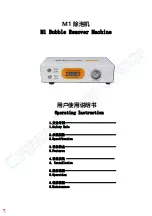
Input Channel Parametric EQ
Use the < Select > buttons to make the top line of the Edit screen
active and the Value Up and Down buttons to navigate to the Input
PEQ screen.
PEQ
INP
The DSP 260 provides a stereo nine-band multi-mode filter generically
referred to as the Input PEQ (Parametric Equalizer). The Input PEQ is a very
powerful and complex set of multi-mode filters. Care must be given
configuring these filter bands, as they interact and can produce unexpected
results. Using the DSP 260 Editor PC application is strongly recommended to
set all but the most simple eq curves.
Each band of the Input PEQ can be configured for a specific filter mode,
frequency, slope or Q and gain setting. Attention must be paid to the ultimate
output gain through the rest of the DSP 260’s audio path, as it is possible to
boost frequency ranges to the point where the internal or external audio
paths of the system may be clipped. Monitoring the output VU meters of the
DSP 260’s output channels will indicate internal clipping; the input meters of
connected amplifiers should do the same.
To bypass any band of the DSP 260’s Input PEQ multi-mode filter bank, set
the desired band’s gain to 0.0dB. This will have
the effect of bypassing the selected filter
band.
The following section details the type of
filters that can be selected for each of the
Input PEQ’s 9 bands and their parameters:
For detailed
EQ plot im-
ages please
see page 45
Low-shelf
The Low-shelf filter is a “hinge” type; in that
frequencies below its frequency setting can be
boosted or cut; hinging on the cut-off
Frequency. The amount of boost or cut (Gain), and the extent of width
of the filter’s transition band (Slope), are determined by the low-shelf
filter’s settings. (See Response/Q and Gain.)
Use the < Select > buttons to navigate to the filter setting you wish to
adjust, and the Value Up and Down buttons to alter these settings.
Press the Value Up and Down buttons once to increment values by one
unit, or press and hold to scroll rapidly through available values. (Values
do not wrap around.)
Hi-shelf
The Hi-shelf filter is a “hinge” type; in that
frequencies above its frequency setting can be
boosted or cut; hinging on the cut-off Frequency.
The amount of boost or cut (Gain), and the width of the filter’s
transition band (Slope), are determined by the hi-shelf filter’s settings.
(See Response/Q and Gain.)
25
Owners Manual
Summary of Contents for DPS260
Page 1: ...Owner s Manual...
Page 2: ...www dynacord com...
Page 45: ...45 Owners Manual EQ Plot Images 6dB PEQ Cuts Q Changes 6dB Oct Shelves at 200Hz and 2kHz...
Page 46: ...46 12dB PEQ Cuts Q Changes 12dB Oct Shelves at 200Hz and 2kHz...
Page 47: ...47 Owners Manual Bessel Filters Butterworth Filters...
Page 48: ...48 Hi Lo Pass Filters Linkwitz Riley Filters...
Page 49: ...49 Owners Manual PEQ Gains...
Page 54: ...Notes 54...
















































